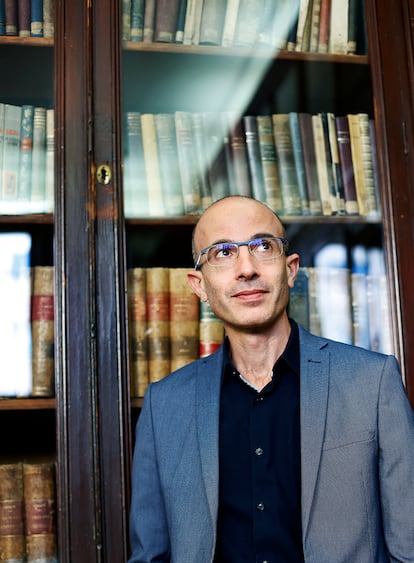Yuval Noah Harari: ‘Netanyahu built a coalition of messianic zealots and shameless opportunists’
The Israeli historian and writer, author of the bestseller ‘Sapiens,’ is one of the world’s leading thinkers. He talks to EL PAÍS about the Israeli prime minister, making science accessible to the public, and why he hates the word exciting

Mud is an important word in the life of Yuval Noah Harari. When he was a child, he says, he lived in a house next to a swamp. There he played soccer, watched the animal species that passed through the area and built castles with the wet earth, even though he ended up covered in mud. He must have been somewhat absorbed between conflicting sensations and paradoxically connected concepts. Perhaps for this reason, he sometimes uses terms that resonate in his subconscious, and although they have nothing to do with his childhood ideals, they do bring to mind certain sticky sensations. “Part of the problem today,” he says, “is that we are flooded by enormous amounts of information that we cannot process and much of what we choose to take in, is junk information.”
That’s why he offers some advice: “The same way you can feed your body junk food, we are feeding our mind junk information. We need an information diet. People should think carefully about the amounts and the quality of the information they take in.”
Diet is also a word that carries weight in Harari’s life. He is vegan, although not extreme about it. If he visits his mother and she adds goat cheese to a cake, he will eat it. His austere vocation and the measure of time govern his life. He manages it well, as we observed while accompanying him on his most recent visit to Madrid, last May. There, in the morning, he spoke for half an hour to hundreds of healthcare employees about the future of the industry. Standing tall, with his high-pitched voice and his ability to explain complex concepts to all types of audiences, he said that we are facing a new era in this field: “The technological revolution will not only lead us to cure the sick, but also to improve the health of those who are healthy.”
Although judging by what Harari said hours later, at the Ateneo de Madrid cultural center during the presentation of the VIII Global Youth Leadership Forum, one wonders to what extent it is worth keeping our vitals at optimal levels: “If we do not regulate new information technologies soon, we will lose control of our lives,” he said. And so, between the advent of the apocalypse and the realization of the best advances and progress within our reach, the Israeli philosopher has built his disquisition of the era in which we live not only in his work — especially his three bestsellers, Sapiens, Homo Deus and 21 Lessons for the 21st Century, which have sold more than 45 million copies — but also in his talks, conferences, and public debates.
Harari is a star of world thinkers. Between these two extremes, aware of the yin and yang he balances in his life and philosophy, I dared to ask him, at the end of his day in Madrid, if he was optimistic. “I try to be a realist,” he replied then. “I think that pessimists think, ‘oh, it’s all over. We are doomed. Everybody’s going to die.’ And then what’s the point of trying to do something? An optimist tends to be complacent: ‘Everything will be okay in the end. We’ll solve it somehow.’ They don’t take responsibility. I think we are facing enormous challenges, but that we have the knowledge and we have the economic resources to solve them.”

At that point, the Gaza war in the Middle East had still not broken out. But in the middle of the conflict, I asked him again. Harari had been mobilizing against the Netanyahu government’s assault on democracy and the situation had not diminished his criticism of the Israeli prime minister: “Netanyahu is obviously not to blame for the attack Hamas launched. But Netanyahu has failed to prepare the country for war,” he says. “He has governed Israel almost without interruption since 2009, and unfortunately he has repeatedly preferred his personal interests over the national interest. He built his political career on dividing the nation against itself, and weakening any state institutions that didn’t blindly serve him.”
The protest against Netanyahu and his controversial judicial reform became a central issue for Harari. “I suddenly found myself very deeply engaged with this day-to-day political crisis in a way that I never imagined that I would. To the point where, in spring, I was on stage in the main square in Tel Aviv giving a political speech to a rally of 150,000 people. Because when the fire reaches your house and you wonder what it would be like to live in a dictatorship, you have no choice,” he told us last May. Above all, when your work is based on freedom of expression and you must write not very pleasant things about political or business leaders... “To think that one day you may wake up and that freedom is gone, that in 2024 we may be close to seeing the last democratic elections in the United States or that the Israeli government will succeed in destroying the independence of the judiciary and the protection of freedom of speech and human rights, forces me to react.”
Over the past year, Harari says, the attacks on his country’s democracy have worsened. “Netanyahu built a coalition of messianic zealots and shameless opportunists, that completely ignored Israel’s many problems — including the deteriorating security situation — and focused instead on grabbing unlimited power for themselves,” he says. “In pursuit of this goal they adopted extremely divisive policies, spread outrageous conspiracy theories about state institutions that oppose their policies, and labeled the country’s serving elites as ‘deep state’ traitors.”
As the Israeli government was pursuing this populist strategy, it turned a deaf ear to the warnings from security forces, says Harari. “The government was repeatedly warned by the IDF and the intelligence agencies that its policies were endangering Israel and eroding Israeli deterrence at a time of mounting external threats. Netanyahu and his colleagues scoffed at the experts and ignored all their warnings,” he says.
“In the most extreme case, when the IDF’s Chief of Staff asked for a meeting with Netanyahu to warn him about the security implications of the government’s policies, Netanyahu refused to meet him,” he continues. “When Defense Minister Yoav Gallant nevertheless raised the alarm, Netanyahu fired him, and was forced to reinstate Gallant only because of an outbreak of popular outrage.”
In the midst of this blindness, Hamas attacked southern Israel on October 7. According to Harari, the attack was aimed at preventing something very specific. “Israel was on the verge of signing a historical peace treaty with Saudi Arabia. That treaty was supposed to normalize relations between Israel and the Arab world, improve the conditions of Palestinians, and restart the Israeli-Palestinian peace process. The prospect of normalization terrified Hamas (as well as its backer, Iran). This is why Hamas attacked, and why it committed such terrible atrocities against Israeli civilians, and even filmed the atrocities. The aim was to foil the Saudi deal and to sow seeds of terrible hatred that will destroy any chance for future peace,” he argues.
Despite everything, Harari hopes the Israeli government does not fall into this trap: “They shouldn’t let Hamas lock us into a forever war. I hope that after disarming Hamas so it cannot foil future peace deals, Israel will go back to the Saudi deal, commit itself to the path of peace, and realize that peace can only be achieved if it includes providing the Palestinians with dignified lives in their homeland.”
But that goal is becoming more and more distant. The Israeli government’s obstinancy and its authoritarian drift in recent years raised fears that the worst would come to pass. And that is what happened. “This behavior over many years corroded the power of the army and the state. Israel has codenamed the current military operation ‘Iron Swords.’ But if you keep iron swords in salt water, eventually they rust. No matter what one thinks of Israel and the Israeli-Palestinian conflict, the way Netanyahu’s populist policies corroded the Israeli state should serve as a warning to other democracies all over the world. If you give power to populists, it can happen to you too.”
If this happens it will not be because Harari has tired of warning about the risks. He has the opportunity to say it to the face of the world’s most influential leaders when he meets with them. On Harari’s trips around the world, it’s common for him to drop by the offices of world leaders, as well as those of businesspeople, foundations and think tanks... He is Silicon Valley’s favorite guru. He may not have come up with an original thought of his own. But no one doubts that he has managed to summarize much of what is happening to us in this era of uncertainty, crammed with data. He has done so by trying to explain our past in Sapiens, the future in Homo Deus and the present in 21 Lessons for the 21st Century.
He probably seduces tech magnates thanks to the principles of counterpoint. Harari doesn’t use a smartphone; although he has one, it’s only for emergencies. He warns of the dangers of artificial intelligence and urgently demands that it be regulated throughout the world, an initiative that the European Union has already taken. He spends two hours a day meditating and at least one or two months a year in a silent vipassana retreat. As for leaders, Harari challenges the basic concepts of political thought: from freedom to equality. He does not believe them to be products of the inalienable right of man, but rather the work of mankind’s capacity for storytelling, as he argues in Sapiens. This does not mean that we are dealing with a furious anarcho-illiberal: quite the opposite. As we have seen, Harari feels increasingly committed to the defense of democracy.
He lives in Tel Aviv, and works out of the offices of his company: Sapienship, founded with his husband and manager, Itzik Yahav. Before publishing Sapiens he was a professor of Medieval and Military History at the Hebrew University of Jerusalem, where, he says, in addition to teaching he wrote articles and studies that barely reached anyone. While studying the conquest of Mexico, among other subjects, and reading Bernal Díaz del Castillo’s True History of the Conquest of New Spain, he got the idea for Sapiens. “In my spare time, I was reading about chimpanzees, for fun.”

And he started to make connections. He understood that he needed to destroy his own writing style: “When you are writing a PhD and publishing academic articles, you learn to write in a way that almost nobody except your colleagues would like to read. I had to forget how to write and relearn how to write in a very accessible way.” He looked for influences. “A book that had a huge impact on me was Jared Diamond’s Guns, Germs, and Steel, which really changed my direction in the sense not only of how to write, but what to write about,” he confesses. “In academia I got the impression that you have to specialize more and more. And Jared Diamond suddenly opened this vista that no, as a scientist, as a scholar, it’s okay to write about the history of the world.” Another influence for Harari was Chimpanzee Politics by Frans de Waal. “It was so fun to read and at the same time it was so profound and changed my understanding of biology, of animals, and of humans.”
Thus, he formed his own style that was radically different from that of the applied doctoral student. A way of telling stories that has hooked tens of millions of people and that combines popular culture and high-level science. Harari uses comics like El Jabato to explain the siege of Numancia or Harry Potter to make the algorithms and disquisitions he investigates more digestible. “My job is to serve as a bridge between these heavy academic works and the general public,” he says. And he doesn’t mind being called a science populist, as some experts have done in a bid to take him down. “It’s true and I don’t think it’s bad. My aim is that: popularizing science. I used to write articles that five people in the whole world read. What I do now is I read these articles and then I try to synthesize them and popularize the message. Not in the sense of spreading conspiracy theories or giving up scientific accuracy, but rather finding a way to reach the general population. If you don’t reach them, then there is a vacuum which tends to be filled by conspiracy theories and fake news.”
There are many scientists who do not know how to communicate their discoveries well, he says. “Within the scientific community, you speak with the force of statistics, of numbers, equations, facts. We don’t do a lot of storytelling or jokes. But it doesn’t work well. Because we are storytelling animals, we think in stories, not in statistics or kinds of equations.” That is the main theory of Sapiens. In his book, Harari maintains that humans have managed to dominate the world thanks to their ability to weave stories that have sustained entire communities over the centuries. “You stay loyal to the scientific facts, but find a way to translate that into an interesting story that would be accessible and engaging even to teenagers.”
But Harari — whose books have been translated into 60 languages — not only tries to convince readers of less-than-appealing theories, such as that humans prevailed over the Neanderthals as a result of the first genocide of mankind or that the climate change upon us is the third, not the first, he also tries to influence those in charge. “I often advise them to step away, to meditate, to find time and space for themselves,” he says. “We want our leaders to work as much as possible for us. But if somebody works all the time and they have no time to relax, think or contemplate, they won’t be good leaders.”
To explain this, he points to a modern parable everyone will be familiar with: “I often notice that if you don’t have time to engage in a wide-ranging conversation with them, nothing good will come out of it. If you only have 20 minutes, you’re not getting anywhere. As soon as the conversation falters, they move on to the next thing.” Is it the fear of emptiness? “In this way, you’re only left with clichés. Good ideas only start to come up when you have silence, when you have boring moments.”
Anxiety has shaped itself against us. Biologically it is unsustainable. That’s why Harari hates the word exciting. “The human body is built on cycles. You’re very excited when there is a danger or an opportunity. But then it passes. If you keep the body in a constant state of excitement, it collapses. In the United States, the word exciting has become the most positive word you can say about anything. Everything is exciting, even meeting somebody. It’s not good. I think just the opposite, if you meet somebody and say, ‘it’s so calming to meet you,’ this should be a compliment.”
He tries not to get too carried away. Even if he is surprised by his own global success. “My specialty is medieval military history, subjects like the Crusades and the unification of Spain, and Ferdinand and Isabella... And by a strange coincidence, I find myself now talking about AI. I didn’t see it coming. I had a quiet life, few people came to my conferences, I published articles that barely attracted anyone. I like history. If you give me a choice of a book about the Catholic Monarchs or about Elon Musk, I’ll take the book about Ferdinand and Isabella.”
His method when putting books together remains grounded in history, his specialty and his passion since he was a child. “I was always very interested in wars, partly because of living in Israel. There was always some war going on. And my father, an engineer, worked in the arms industry,” he recalls. Even so, the first conflict that made an impression on him was the Falklands War: “Strangely, I was fascinated by what was happening on the other side of the world.”
After celebrating 10 years of uninterrupted success with a commemorative edition of Sapiens in 2023, he is currently immersed in three volumes for children: his series entitled Unstoppable Us, which summarizes the history of the world. He is also working on a project that is set to come out this year. “A new book that will deal with AI and information technology, but from a broad historical perspective. It has many more chapters on ancient history than on the latest developments in Silicon Valley. In the end, I’m a historian, not a computer scientist,” he says, adding that it doesn’t have a title yet. “It’s the last thing I do. It’s going quite well. Part of the reason the title comes last is because in a real process of research, you don’t know what you’re going to say. If you know everything in advance, then what’s the point? You didn’t learn anything new.”
Sign up for our weekly newsletter to get more English-language news coverage from EL PAÍS USA Edition
Tu suscripción se está usando en otro dispositivo
¿Quieres añadir otro usuario a tu suscripción?
Si continúas leyendo en este dispositivo, no se podrá leer en el otro.
FlechaTu suscripción se está usando en otro dispositivo y solo puedes acceder a EL PAÍS desde un dispositivo a la vez.
Si quieres compartir tu cuenta, cambia tu suscripción a la modalidad Premium, así podrás añadir otro usuario. Cada uno accederá con su propia cuenta de email, lo que os permitirá personalizar vuestra experiencia en EL PAÍS.
¿Tienes una suscripción de empresa? Accede aquí para contratar más cuentas.
En el caso de no saber quién está usando tu cuenta, te recomendamos cambiar tu contraseña aquí.
Si decides continuar compartiendo tu cuenta, este mensaje se mostrará en tu dispositivo y en el de la otra persona que está usando tu cuenta de forma indefinida, afectando a tu experiencia de lectura. Puedes consultar aquí los términos y condiciones de la suscripción digital.









































